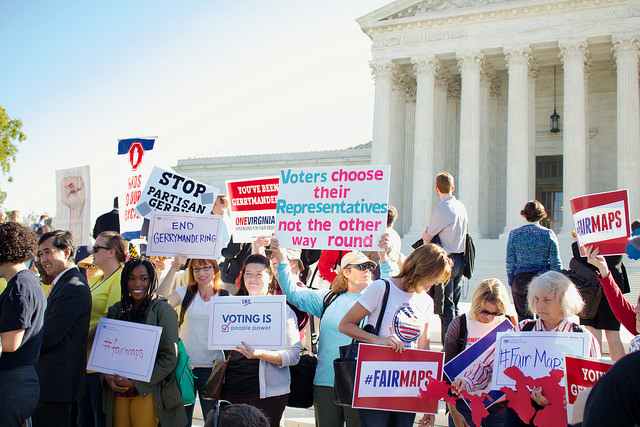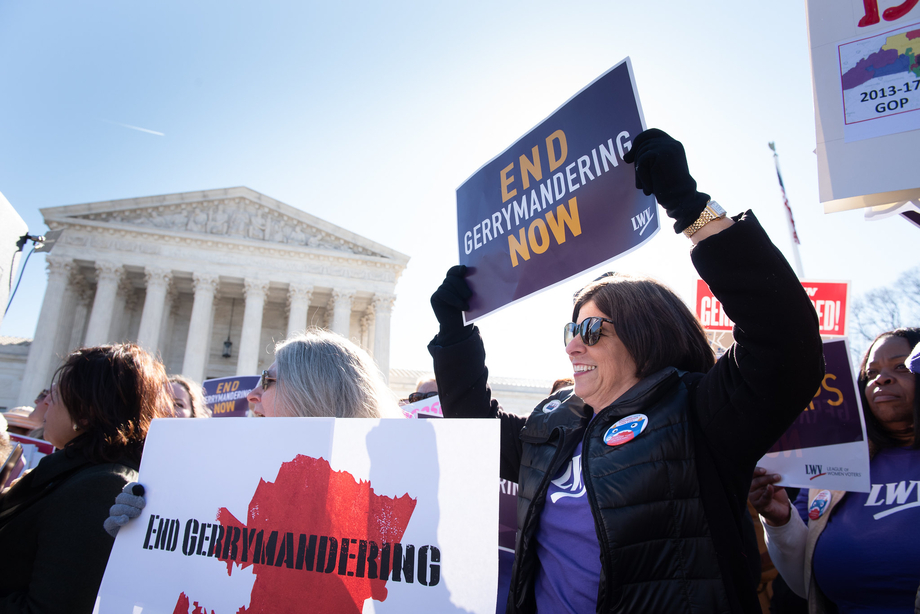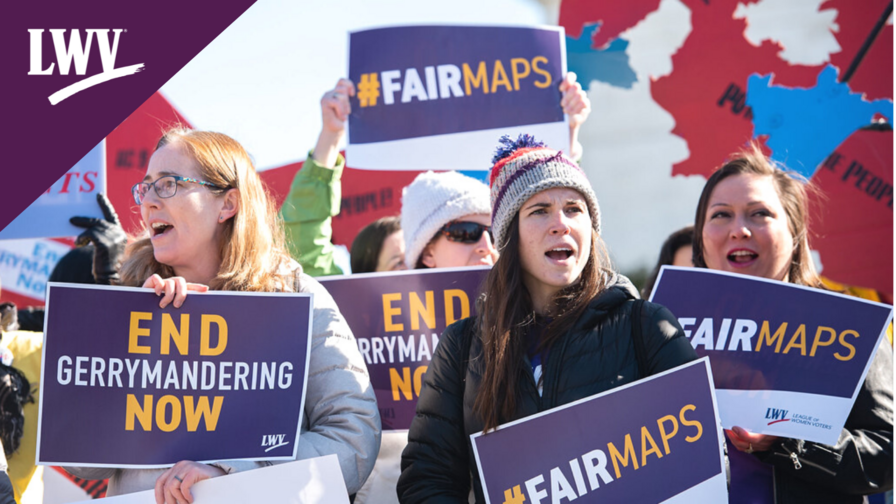3 Cases of Redistricting Reform: 2018 vs. Today
- Justice Elena Kagan
Partisan gerrymandering, i.e., designing electoral maps to benefit a particular political party during the redistricting process, goes against the core value of our democracy: that the people should choose their representatives, not the other way around. While the federal courts have decided they will ignore partisan gerrymandering, advocates across the country, joined by local Leagues, have taken up the fight for fair maps.
In November of 2018, voters passed ballot initiatives in three states to curb gerrymandering by reforming the redistricting process. Four years later, as redistricting battles once again sweep the nation, it’s time to look back at what those initiatives accomplished, and what still needs to be done.

Missouri: The Clean Missouri Initiative and Amendment 3
In 2018, voters in Missouri passed the Clean Missouri initiative, a ballot measure that included transparency guidelines, greater limits to lobbying and campaign contributions, and a revamp of the redistricting process.
Clean Missouri attempted to take politics out of the districting process. It removed the power to draw legislative districts from the state legislature and gave it to a non-partisan state demographer. This was meant to prevent politicians from choosing their voters.
Missouri voters passed the Clean Missouri initiative, known as Amendment 1, with 62% of the vote. But almost immediately, the legislature started working to undo the hard-fought victory.
In 2020, another initiative, Amendment 3, made it on the ballot. Amendment 3 repealed Clean Missouri, eliminating the demographer position and giving the power to draw maps to a commission appointed by the governor. It also made it more difficult to challenge the final maps in court.
The League of Women Voters of Southwest Missouri came out against Amendment 3. As co-presidents Marjorie Bramer and Julie Steiger wrote in a 2020 editorial, “The amendment seeks to overturn what Missourians approved just two years ago as Clean Missouri. But it goes way beyond a simple reversal. If approved, Amendment 3 would put in its place a redistricting process unlike anything Missouri has ever seen — and more extreme than any other in America.”
Support the fight for fair and representative district maps
Bramer and Steiger also voiced concern that Amendment 3 broke with 150 years of precedent by only counting voting-eligible adults as part of the districts’ populations and ignoring those under 18, and that the ballot language proposed by advocates for Amendment 3 was “misleading, unfair, and insufficient.”
Despite these concerns, voters narrowly passed Amendment 3 with 51% of the vote.
Under Amendment 3, the current redistricting process has led to mixed results. In January of 2022, the Redistricting Commission for the House finalized its map, which reflected input from the Missouri League of Women Voters. Missouri League President Marilyn McLeod celebrated the new map: “This map will provide more competitive House races in future elections.” she said. “The League believes that competitive districts make for a better democracy.”
But the Redistricting Commission remains deadlocked on the Senate side. Under Amendment 3, the stalled commission shifts the map-drawing process to a panel of six judges. But Amendment 3 provides no guidance for that panel, so at this point, it is difficult to predict the results.
Thus, while the House maps are somewhat promising, the controversy surrounding the Senate maps has borne out the concerns over Amendment 3 voiced by Missouri Leagues.
Michigan: Proposal 2 and the Independent Citizens Redistricting Commission
In 2018, voters in Michigan passed Proposal 2, which contained a variety of election reforms, including non-partisan redistricting. Proposal 2 passed with 61% of the vote. It took the power to draw state political boundaries from politicians and gave it to a Commission comprised of citizens, including representatives from both parties and non-partisan representatives. This group is known as the Independent Citizens Redistricting Commission. Proposal 2 requires the Commission to consider federal requirements, such as the Voting Rights Act; contiguity; communities of interest; lack of favor to political parties or incumbents; county, city, and township lines; and compactness. The amendment also contained transparency requirements, including public hearings and a notice and comment period.

Proposal 2 also included several other pro-voter reforms, including automatic and same-day voter registration, as well as no-excuse absentee voting in the 40 days before an election.
The Independent Citizens Redistricting Commission’s first bite at the apple was the 2020 redistricting cycle. The Commission faced controversy from the very beginning of the cycle.
First, they received the U.S. Census data, from which they would draw their maps, on a significant and unprecedented delay. With the support of the Michigan League of Women Voters, the Commission sought a deadline extension its maps. The Michigan Supreme Court refused to grant the extension. As Michigan League President Christina Schlitt commented, the Court’s ruling did “not give the commission enough time to provide the 45-day public comment period on its proposed new legislative maps.”
Beyond the delays, the Commission’s work has faced allegations of partisanship. In February of 2022, the Michigan League of Women Voters, together with a coalition of voting rights advocates, filed a lawsuit against the Commission on the grounds of partisan bias. The coalition’s experts have argued that the Commission’s map will likely elect a majority of Republicans even if Republicans win fewer votes.
The League’s lawsuit in Michigan seeks to realize the goals of partisan fairness that voters approved in 2018. As Michigan League President Christian Schlitt put it, “When Michigan voters overwhelmingly passed Proposal 2 in 2018 establishing the Michigan Independent Citizens Redistricting Commission, they spoke loud and clear in their support for partisan fairness.”
To participate in fair redistricting efforts in your community, join one of the 700+ state and local Leagues.
Utah: Proposition 4
In 2018, voters in Utah passed Proposition 4, which created a seven-member independent redistricting commission empowered to draft state legislative and congressional maps. The Proposition also mandated transparency, requiring the commission to hold public hearings and release public data.
The Utah League of Women Voters advocated for Proposition 4, from gathering signatures to get the Proposition on the ballot to educating voters about redistricting.
In 2020, however, the legislature renegotiated the redistricting process, relegating the independent commission to an advisory role. In November of 2021, the commission recommended 12 maps to the legislature. But the legislature ignored those maps, instead pushing forward with its own map.
The map chosen by the Utah legislature in 2021 has faced allegations of partisanship, not least because it splits Salt Lake City into four districts. In March 2022, the LWV of Utah, Mormon Women for Ethical Government, and individual voters filed a lawsuit to block Utah from implementing its congressional redistricting map and reinstate the citizen-led initiative that established an independent redistricting commission and binding anti-gerrymandering requirements.
The purpose of ballot initiatives is to give the people a direct role in democracy. Since federal courts have given up on trying to address partisan gerrymandering, and Congress does not appear poised to step in, state-level advocacy offers an opportunity for reform. But reformers should be wary of pushback — each of the states that passed redistricting reform in 2018 has faced fervent opposition by politicians who want to maintain control over drawing maps.
Nevertheless, the reforms enacted give advocates for fair maps the legal tools to keep elections fair and return power to the people, where it belongs.
The Latest from the League
The 2021 redistricting cycle was the first one without the full protection of the Voting Rights Act. Without federal oversight, many states and local municipalities have used this advantage to implement racially gerrymandered maps, i.e. district lines that limit the voting power of voters of color.
People Powered Fair MapsTM is a national redistricting program of the League of Women Voters focused on creating fair political maps nationwide. The program includes actions in all 50 states + D.C.
Today, League of Women Voters of Utah (LWVUT), Mormon Women for Ethical Government (MWEG) and individual voters filed a lawsuit to block Utah from implementing a congressional redistricting map that constitutes an extreme partisan gerrymander and to reinstate the citizen-led initiative that established an independent redistricting commission and binding anti-gerrymandering requirements.
Sign Up For Email
Keep up with the League. Receive emails to your inbox!
Donate to support our work
to empower voters and defend democracy.






